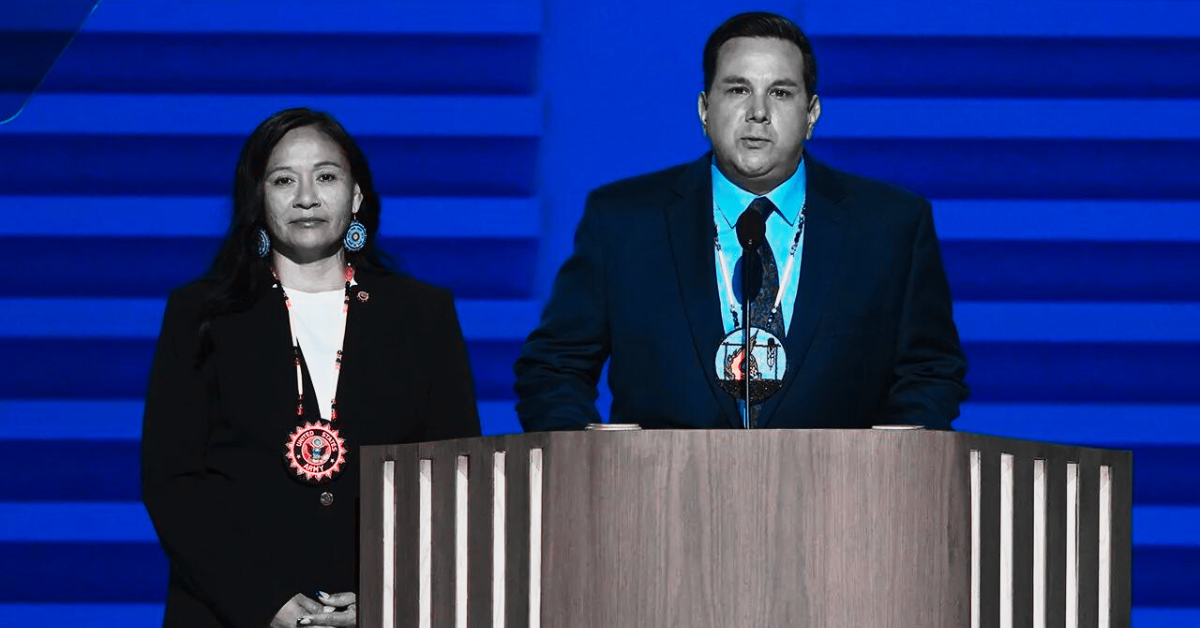
Sep 6, 2024 4:57:52 PM
Last month, I tuned into the Democratic National Convention online. The one thing that was very clear to me was the Democratic Party’s attempt to be inclusive of and honor the intersections of many identities. For the most part, I thought they did a pretty good job, but a couple of things bothered me.
The first thing was the Democratic Party deciding to open the convention with a land acknowledgment, honoring the people of the Prairie Land Potawatomi Nation. While this appears to be an admirable act on the surface, it came off as being performative and hypocritical because of the Democratic party’s continuous role in enacting harmful policies that perpetuate the active extermination and displacement of Native tribes. From supporting pipelines that threaten sacred lands to failing to address the epidemic of missing and murdered Indigenous women, the party has consistently fallen short in its commitment to Native sovereignty and rights. This behavior pattern undermines the land acknowledgment's sincerity, reducing it to a performative act rather than a genuine commitment to change.
I was even more bothered by the fact that not a single Palestinian-American speaker was invited to speak at the Convention. I kept thinking, ‘If the Democrats are truly serious about working towards a ceasefire in Gaza, why didn’t they extend the speaking invitation to Michigan Congresswoman Rashida Tlaib, Georgia State Representative Ruwa Romman, or another Palestinian-American activist to speak at the convention?’ Considering that the genocide of Palestinian people in Gaza has been going on for over 300 days and that this year’s Convention took place in Chicago, where one will find the largest Palestinian community in the United States, it’s disheartening that the Democratic Party didn’t take advantage of the opportunity to connect with the Palestinian people.
Between the performative land acknowledgment and the absence of a Palestinian-American speaker at the Convention, what should be clear to all is that these missteps provide a glaring oversight that should resonate deeply with teachers and school leaders committed to engaging in DEIJ (Diversity, Equity, Inclusion, & Justice) work in their schools.
These missteps should be a stark reminder that we cannot be selective in whose voices we amplify, especially when striving for true intersectionality in our efforts to create more inclusive, identity-affirming learning environments.
The missed opportunities at the DNC should serve as a wake-up call for educators and school leaders. It challenges us to reflect on how we approach DEIJ work in our schools. Are we genuinely being inclusive, or are we selectively engaging with specific identities while ignoring others?
To create a genuinely inclusive school environment, we must ensure all students feel seen, heard, and valued.
Here are a few steps educators and school leaders can take to ensure a more intersectional approach to DEIJ work this school year:
In the end, the Democratic National Convention’s failure to include a Palestinian-American speaker and its performative land acknowledgment are stark reminders of the dangers of selective engagement in justice work. The lesson for educators and school leaders is clear: DEIJ work must be genuinely intersectional and inclusive, embracing all historically marginalized voices and identities. Schools can only create environments where every student feels seen, heard, and valued by committing to this comprehensive approach.
The path forward requires not just symbolic gestures but meaningful actions that address the full complexity of identity and oppression in our schools and society.
Kwame Sarfo-Mensah is the founder of Identity Talk Consulting, a global educational consulting firm that specializes in developing K-12 teachers into identity-affirming educators. Throughout his 17-year career as a classroom teacher, author, and consultant, Kwame has earned numerous accolades for this work, which include being honored as the 2019 National Member of the Year by Black Educators Rock, Inc. and being recognized as a Top Education Influencer by brightbeam, Inc. in 2021 and 2022. His newest book, "Learning to Relearn: Supporting Identity in a Culturally Affirming Classroom", is out now.
Few issues in education spark more tension and debate than standardized testing. Are they a tool for equity or a burden on students? A necessary check on school systems or a flawed measure of...
Charter schools are public schools with a purpose. Operating independently from traditional school districts, they're tuition-free, open to all students, and publicly funded—but with more flexibility...
Despite the benefits of a diverse teaching force, prospective teachers of color fall out of our leaky preparation pipeline at every stage: preparation, hiring, induction, and retention. Here’s what...
Ed Post is the flagship website platform of brightbeam, a 501(c3) network of education activists and influencers demanding a better education and a brighter future for every child.
© 2020-2025 brightbeam. All rights reserved.
Leave a Comment